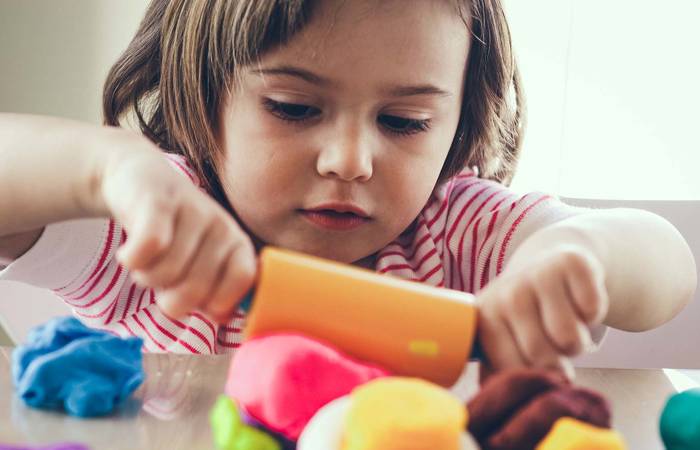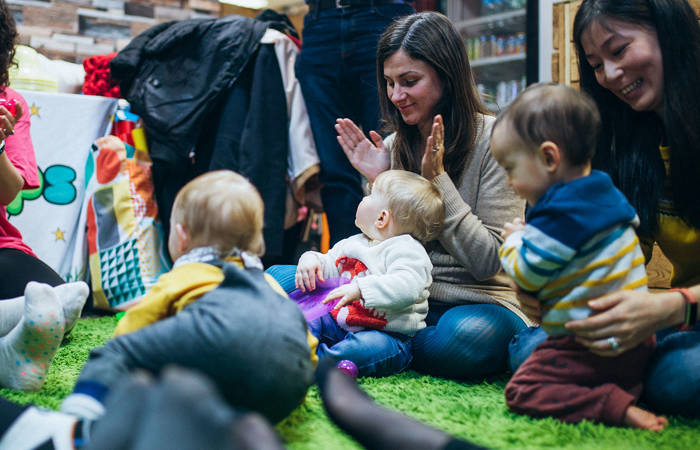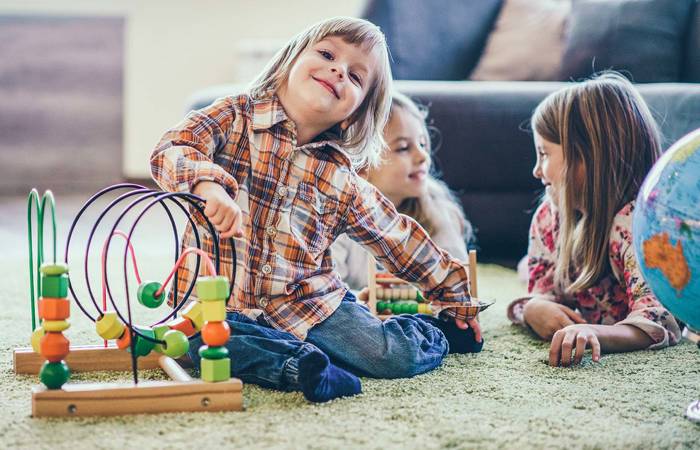Like what you see?
Sign up to receive more free parenting advice.
Thank you for subscribing to our newsletter!
Early Learning

Credit: iStock.com/galina-kovalenko
Play can be easily dismissed. After all, how important can playing tea party with stuffed teddies, or ‘stuck in the mud’ be?
Experts would argue that it’s extremely important.
Particularly, peer play.
A recent study by the University of Cambridge found that children who are able to successfully engage in peer play in their preschool years were more likely to experience better mental health outcomes later in life.
“Peer play encompasses when a child engages with their peers in a broad range of play activities, like pretend play or making up their own rules of a game,” explains Emeritus Professor Karen Stagnitti.
“The key features of true peer play are when it’s child-initiated and enjoyable.”
Peer play provides children with invaluable skills which equip them later on in their life.
Professor Stagnitti recommends that variety is the key when it comes to peer play.
Whether that is the type of peers, from their neighbourhood friends, preschool or daycare friends or individual play dates, or the variety in the location, from your home to someone else’s home, to the park or daycare.
Variety helps to enable children to confidently transfer their skills learnt during peer play from one situation to the other.
She adds that peer play is different to playing with siblings or parents.
“Parental play and sibling play is still important, but peer play gives children a unique experience,” Professor Stagnitti explains.
“Peers come from different families, with different perspectives and views which add to the play as children begin to understand that other people do things differently and learn to adapt and compromise in order to get along.”
For children who have not engaged in peer play at an early age, they may struggle.
“I have worked with 13 to 14 year olds who don’t have the foundational skills that peer play equips preschoolers with, and those teenagers really struggle, not only socially but also with academic subjects like literacy,” says Professor Stagnitti.
“If children haven’t built up the skills involved in peer play, their life later on is much harder and they tend to be more likely to withdraw, isolate themselves or anger easily… all of these aren’t very mentally healthy.”
Peer play is more than just having a friend
Playing with a friend is always much more enjoyable than playing on your own. But there is more to it than just being social.
“For children to engage in peer play they have to engage in a range of skills simultaneously,” says Professor Stagnitti.
“Play is one of the most intellectually demanding activities of children at preschool.”
One of the first skills children must learn is the art of negotiation.
Professor Stagnitti explains that when children first engage in peer play meta-communication occurs.
This is where the children talk about what they are going to be doing as part of their play, whether that is discussing the imagined scenario they are about to engage in, or the rules of the game.
“It’s about helping everyone to have a shared meaning of the play, from identifying objects in the play and what they represent, the characters that everyone will be, or the story line and the problem that has been created which needs to be solved,” she says.
“Children have to negotiate the problem with their friends and be adaptable and flexible, not only as the problem might change through the play (to something a bit more exciting as the play progresses), but also if their friends don’t want to have the same problem.”
Children also need to self-regulate during play.
After all, no one wants to play with someone who is quick to anger or cry and storm off in the middle of launching dinosaurs into outer space.
“Children need to learn to control their emotions and renegotiate with their peer when they disagree,” says Professor Stagnitti.
Children also need to be subconsciously aware of how their friends are feeling during peer play.
“If their friends are getting bored, or if they’re enjoying themselves, or whether it’s time to shift the game,” she adds.
They also need to use their cognitive thinking skills to come up with the ideas of the play, from what everyone’s role is and what the storyline is.
Finally, they need to feel safe during play.
“Children practice these skills everyday through play and the more you do something, the quicker you can do it,” Professor Stagnitti highlights.
“By late childhood, between ten and 12 years old, all those skills of self-regulation, negotiation, being flexible and adaptable, cause and effect thinking, understanding narrative, understanding rule development… they are skills children can build upon and take to the next level in their teens when social relationships are incredibly important to them.”
Parental play and sibling play is still important, but peer play gives children a unique experience.Emeritus Professor Karen Stagnitti
Stay up to date with the latest news and articles from First Five Years
Thank you for subscribing to our newsletter!
Peer play and mental health
The Cambridge study notes that social relationships have a profound influence on mental health.
“Individuals experiencing more positive reciprocal relationships are not only likely to experience good mental health themselves, but also to contribute to the mental health of people in their social networks,” the researchers write.
The researchers found that peer play ability at three years old significantly predicted lower externalising problems, like hyperactivity and conduct problems, and lower internalising problems like peer and emotion problems, at the age of seven years old.
They found successful peer play ability could facilitate the development of sociocognitive and self-regulatory skills which contribute towards emotional intimacy and building higher quality peer networks which reduce the risk of potential mental health problems.
The researchers found the sociocognitive skills developed during peer play led to making new friends, resolving disputes with friends, and sustaining existing friendships.
While the regulatory skills gained from peer play are important to positive mental health development as they help to reduce over-controlled and under-controlled attention, emotions and behaviours.
What if my child doesn’t play well with others?
Professor Stagnitti notes that if parents are worried about how their child plays with other children, it may help if they can observe which part the child is having problems with.
“The first part to look at is how they play, do they have the skills to play,” she says.
“Watch your child play, do they know how to play with toys? Sure, they can have a lot of toys to play with, but do they know how to use something like a truck, that you push it along to drive it, the noises it can make, that kind of thing.”
She also says that for children aged three and over, they should know how to add a story to the play.
If children are struggling with their play skills, Professor Stagnitti recommends parents play with them to show them how to use toys, read to them to spark their imagination for adding stories to their play and also, demonstrate playing out story lines and encourage the child to add to the story line as their confidence grows.
For parents who might struggle with play, Professor Stagnitti has developed, Explaining Pretend Play For Parents and Carers, a guide for parents on pretend play and how to support their child during pretend play.
“The other part that parents need to consider is whether their child is simply just shy,” she says.
For shy children, Professor Stagnitti recommends organising individual play dates as this can be easier for shy children to engage in than being thrown into a group of energetic children.
“At preschool help guide the child to a quiet area of the classroom to begin their day,” she adds.
“Eventually, another child will join them and that way they can be eased into the play at school.”






